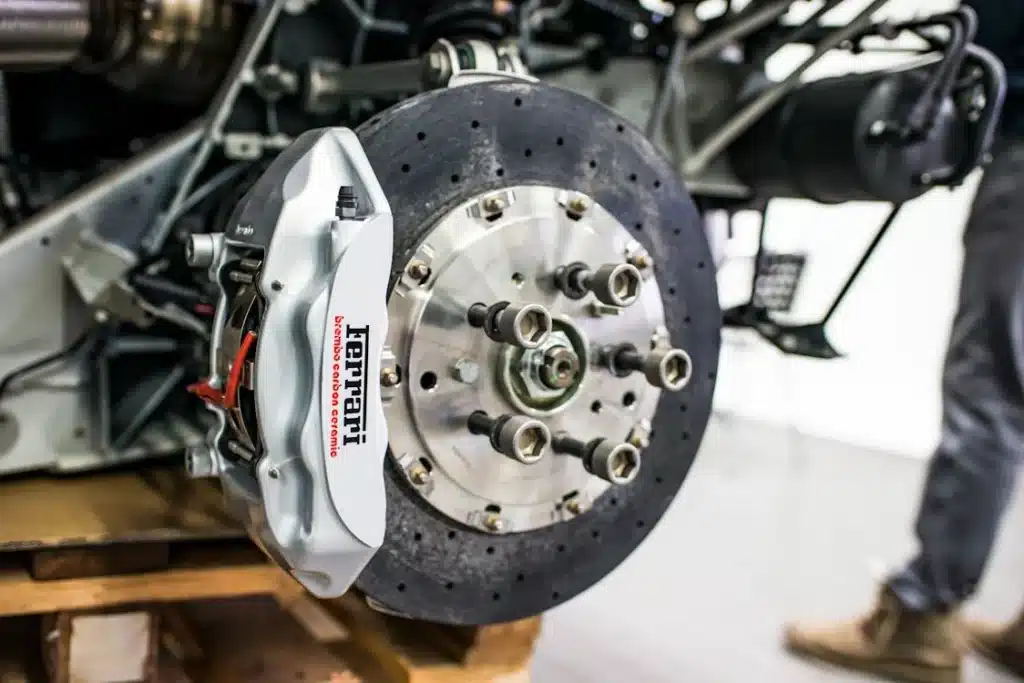Brake pads have evolved over time to meet drivers’ needs for safer and more efficient braking. Today, brake pads come in different types, from traditional ones like semi-metallic and organic to newer ones like ceramic.
Ceramic brake pads have become popular among drivers due to their exceptional performance and durability. They offer benefits such as reduced noise and brake dust, improved braking performance, and longer rotor life. As drivers prioritize safety and reliability, ceramic brake pads have become a preferred option for enhancing their vehicle’s braking capabilities.
In this article, we’ll explore ceramic brake pads in detail, discussing their unique features and benefits. Whether you’re considering upgrading your brake pads or want to learn more about vehicle maintenance, this article will provide valuable insights to help you make informed decisions.
Benefits of Using Ceramic Brake Pads for Your Vehicle

Ceramic brake pads come with many great benefits that can make your drives smoother and more pleasant. They’re designed to handle different driving situations really well and offer more than just basic braking. Here are some of the top reasons why more and more drivers prefer ceramic brake pads.
Quieter Braking
Ceramic brake pads are incredibly quiet compared to other types. The materials in ceramic brake pads don’t make the same noises as metal pads, which cuts down a lot on the annoying squealing sound that often comes with braking. If you’re someone who likes a peaceful and noise-free drive, ceramic brake pads could be the perfect choice for you.
Reduced Brake Dust
Another big plus of ceramic brake pads is that they produce much less brake dust. The dust that comes off these pads is fine and doesn’t stick to your wheels. This means your wheels stay cleaner for longer, making your car look nicer. Plus, less dust means less wear and tear on your wheels, which can help them last longer and save you money.
Longer Lifespan
Ceramic brake pads also tend to outlast pads made from other materials. Because the ceramic material wears down more slowly, you won’t need to replace your brake pads as often. Over time, this makes ceramic brake pads a more cost-effective option, saving you money on frequent replacements.
Enhanced Stopping Power
These pads provide excellent stopping power under a variety of conditions. They perform consistently well across a wide range of temperatures, ensuring that your brakes remain reliable whether it’s hot or cold outside. This is especially important if you find yourself in extreme weather conditions or need to do a lot of stop-and-go driving in the city.
Less Wear on Brake Rotors
Ceramic brake pads are easier on your brake rotors than metallic pads. They are less abrasive, which means they cause less wear and tear on the rotors. Since rotors are expensive to replace, using ceramic pads can help extend their life and save you money on both repairs and replacements.
Comparing Ceramic Brake Pads to Other Brake Types
When choosing brake pads, it’s important to understand how different types of pads stack up against each other. Ceramic, semi-metallic, and organic brake pads have distinct characteristics and benefits that make them suitable for different driving conditions and preferences. Here’s how ceramic brake pads compare to the other common types:
Ceramic vs. Semi-Metallic Brake Pads
- Performance: Ceramic brake pads are known for their quiet operation and low dust production, making them ideal for everyday driving and maintaining clean wheels. On the other hand, semi-metallic pads offer excellent heat dissipation and are preferred for high-performance driving or heavier vehicles due to their durability under harsh conditions.
- Wear and Tear: Ceramic pads are gentler on brake rotors than semi-metallic pads, which are more abrasive. This means ceramic pads can potentially extend the life of your brake rotors due to less aggressive wear.
- Cost: Initially, ceramic brake pads may cost more than semi-metallic pads. However, the reduced wear on rotors and the longer lifespan of ceramic pads can lead to cost savings over time.
Ceramic vs. Organic Brake Pads
- Material Composition: Organic brake pads are made from a mixture of fibers and filler material bound together with a resin. They are generally softer and quieter than semi-metallic pads, but they wear out faster and are less heat-resistant than ceramic pads.
- Performance in Conditions: Organic pads perform well at lower speeds and are adequate for light to moderate braking. However, they can experience more brake fade in high-temperature situations than ceramic pads, which offer superior performance in a wide range of temperatures and driving conditions.
- Durability and Maintenance: Organic pads may require more frequent replacements due to their softer material wearing out quicker. Ceramic pads, while more expensive upfront, typically offer a better long-term value due to their durability and minimal maintenance.
Trust Welsh Automotive for Reliable Brake Maintenance
At Welsh Automotive, we understand the importance of reliable brakes for your vehicle’s safety. Our team of ASE-certified technicians is ready to deliver comprehensive brake services, including inspections covering brake pads, shoes, and hydraulic brake fluids.
Our dedicated team is committed to providing top-notch care, using industry-standard parts to ensure optimal performance and cost savings for you. With convenient locations in West Chester and Exton, PA, maintaining your brakes has never been easier.
